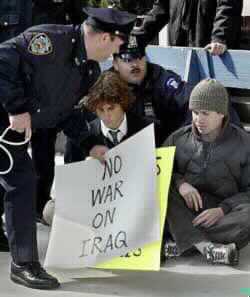HIGHLIGHTS: Bush Says Policy Remains Centered on 'Regime Change' in Iraq Adding that if Iraq Accepts New Terms for UN Inspectors to Return that in Itself Would Signal Regime Has Changed in Baghdad||New U.S. Text Contains Elements Designed to Ease French-Russian Objections|| USS Constellation to Deploy to the Gulf Early November on a "compressed timetable'|| Nobel Peace Prize Laureates Meeting in Rome on Monday Deliver Resounding "No" to War with Iraq|| STORY: The five permanent members of the UN Security Council met to discuss a new revised text on Iraq that the United States hopes will overcome opposition led by Russia and France.
The White House said a resolution appeared imminent but other members gave indications that nothing should be taken for granted.
"I can't predict the exact dates that they will take concrete action, but I think it's moving forward nicely," said Ari Fleischer, who has been monitoring the meetings hosted by US Ambassador to the United Nations John Negroponte.
However Russian Deputy Foreign Minister Yury Fedotov said Moscow hopes that any new US resolution on Iraq "will not contain any unacceptable elements from the old American proposals," Itar-Tass news agency reported.
US President George W. Bush said Monday US policy towards Iraq remains centered on regime change.
"We don't believe he's going to change," Bush said, adding that if Saddam were to meet "all of the conditions" laid out by the United Nations "that in itself will signal the regime has changed."
State Department spokesman Richard Boucher said the new revised text -- which builds on a tough US-British proposal first circulated earlier this month -- contained changes designed to ease French and Russian objections to the automatic authorization of the use of force.
"The revisions take into account the ideas that were raised by our partners during our consultations," Boucher told reporters. "We made some changes in order to achieve our goals and garner support within the council."
A US navy official said meanwhile the aircraft carrier USS Constellation is slated to deploy to the Gulf in early November on a "compressed" timetable.
The Constellation's departure from San Diego, California with seven other warships would put at least two US carrier battle groups in the region in early December amid a mounting military showdown with Iraq.
France, China and Russia have all expressed a willingness to see the results of this round of arms inspections, hoping to avoid a conflict that could destabilize the Middle East.
France has proposed a two-resolution process, with an initial resolution that would revise the arms inspections guidelines, and a second that would prescribe the use of force in the event of Iraqi noncompliance.
However, the United States hopes to avoid a second resolution by getting the other four members to agree to the next text submitted to the other four permanent council members.
If the council approves the first resolution, "the United States will have all the authority that it needs along with our allies" to undertake military action to strip Saddam of weapons of mass destruction, Fleischer added.
The US Congress has already approved a resolution authorizing Bush to use military force to disarm and oust Saddam when Bush decides that diplomatic overtures to Baghdad have failed.
However, the White House spokesman did not rule out the possibility that the council would debate a second resolution, perhaps one explicitly authorizing the use of force against Iraq.
"It is always the right of any nation that is a member of the United Nations Security Council to come forward at any time, in all times with any resolution that they see fit," he said.
Nobel peace prize laureates meeting in Rome on Monday delivered a resounding "No" to war with Iraq and gave their full backing to the need for UN-brokered diplomacy to avoid a conflict.
In a joint statement at the end of the third annual forum of Nobel peace laureates, participants including former Soviet president Mikhail Gorbachev (a winner in 1990) and former Polish president Lech Walesa (1983) said recourse to arms as a way of settling problems between states was unacceptable.
PHOTO CAPTION
Police prepare to arrest demonstrators protesting the possibility of war with Iraq outside the United States Mission to the U.N. in New York on October 21, 2002. During a White House event later in the day, President Bush said he believed Iraq could be disarmed peacefully and he was willing to give diplomacy one more try. (Peter Morgan/Reuters)
- Author:
& News Agencies - Section:
WORLD HEADLINES


 Home
Home Discover Islam
Discover Islam Quran Recitations
Quran Recitations Lectures
Lectures
 Fatwa
Fatwa Articles
Articles Fiqh
Fiqh E-Books
E-Books Boys & Girls
Boys & Girls  Hajj Rulings
Hajj Rulings Hajj Fatwas
Hajj Fatwas














